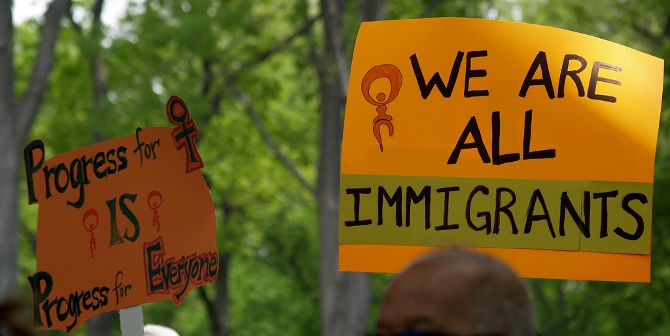This week the Supreme Court will hear cases from Michigan, Ohio, Kentucky and Tennessee on whether those states’ bans on same-sex marriages are constitutional, and if they must recognize same-sex marriages performed in other states. USAPP editor, Chris Gilson, compiles a selection of articles from our archive which cover the debate over the constitutionality and recognition of same-sex marriages, and on public attitudes to such unions, which has led to the current cases before the Supreme Court.
So-Called Religious Freedom Restoration Acts (RFRAs) Protect Gender and Sexual Orientation Discrimination, Not Religious Freedom
 More than two decades after the Clinton administration passed the federal Religious Freedom Restoration Act (RFRA), religious freedom bills are once again in the news. Leslie C. Griffin writes that the new RFRA legislation coming from Arkansas and Indiana has originated from fears over same-sex marriage rather than any real desire to protect religious freedoms. She argues that through RFRAs, those against LGBT rights are seeking a legal method of discrimination and that these laws can have unintended consequences which can cause harm to other groups as well.
More than two decades after the Clinton administration passed the federal Religious Freedom Restoration Act (RFRA), religious freedom bills are once again in the news. Leslie C. Griffin writes that the new RFRA legislation coming from Arkansas and Indiana has originated from fears over same-sex marriage rather than any real desire to protect religious freedoms. She argues that through RFRAs, those against LGBT rights are seeking a legal method of discrimination and that these laws can have unintended consequences which can cause harm to other groups as well.
Alabama’s resistance to marriage equality will be short lived
 On Monday, the United States Supreme Court denied a request to stay the ruling of a federal district judge which had invalidated Alabama’s constitutional amendment banning gay marriage. Despite the ruling, many of the state’s probate judges have refused to provide marriage licenses, and were also instructed not to do so by the state Supreme Court’s Chief Justice. Heather Elliott writes that the judges’ resistance is in part due to the fact that they face elections in a state where only 32 percent of the population favor same-sex marriage. She argues that Alabama is on the wrong side of states’ rights and marriage equality, and that the Supreme Court’s coming ruling on same-sex marriage will remove all doubt in Alabama, and across the country.
On Monday, the United States Supreme Court denied a request to stay the ruling of a federal district judge which had invalidated Alabama’s constitutional amendment banning gay marriage. Despite the ruling, many of the state’s probate judges have refused to provide marriage licenses, and were also instructed not to do so by the state Supreme Court’s Chief Justice. Heather Elliott writes that the judges’ resistance is in part due to the fact that they face elections in a state where only 32 percent of the population favor same-sex marriage. She argues that Alabama is on the wrong side of states’ rights and marriage equality, and that the Supreme Court’s coming ruling on same-sex marriage will remove all doubt in Alabama, and across the country.
Americans support partnership benefits for same-sex couples, but are less positive towards marriage rights and showing affection in public.


 Over the past decade, same-sex marriage has grown in acceptance, and is now legal in 35 U.S. states. But how favorable are Americans towards same-sex couples? In new research that examines attitudes towards formal rights and informal privileges for same-sex couples, Long Doan, Lisa R. Miller, and Annalise Loehr find that while most Americans are supportive of same-sex couples having partnership benefits such as family leave and inheritance rights, this support does not extend to more informal privileges such as public displays of affection. They also find that many of those who support partnership rights for same-sex couples do not support their right to be married.
Over the past decade, same-sex marriage has grown in acceptance, and is now legal in 35 U.S. states. But how favorable are Americans towards same-sex couples? In new research that examines attitudes towards formal rights and informal privileges for same-sex couples, Long Doan, Lisa R. Miller, and Annalise Loehr find that while most Americans are supportive of same-sex couples having partnership benefits such as family leave and inheritance rights, this support does not extend to more informal privileges such as public displays of affection. They also find that many of those who support partnership rights for same-sex couples do not support their right to be married.
The legalization of same-sex marriage in a state is a signal that causes certain groups to change their opinion to support the policy.


 Five years ago, Iowa became the third U.S. state to allow same-sex marriages when the state Supreme Court issued a unanimous and very unpopular decision in the case Varnum v. Brien. Since this decision, public attitudes towards same-sex marriage in the state, and the United States in general, have changed dramatically. Rebecca Kreitzer, Allison Hamilton and Caroline Tolbert draw on a unique panel telephone survey in which the same individuals are interviewed before and after the Iowa Supreme Court legalized same-sex marriage to understand what groups of citizens were most likely to change their opinions on marriage rights in response to the Court’s decision. We find that the signaling of new social norms by the Court pressured some respondents to modify their attitudes. As the states continue on this rapid trajectory of legalizing same-sex marriage, we may see substantial shifts in attitudes towards LGBT rights.
Five years ago, Iowa became the third U.S. state to allow same-sex marriages when the state Supreme Court issued a unanimous and very unpopular decision in the case Varnum v. Brien. Since this decision, public attitudes towards same-sex marriage in the state, and the United States in general, have changed dramatically. Rebecca Kreitzer, Allison Hamilton and Caroline Tolbert draw on a unique panel telephone survey in which the same individuals are interviewed before and after the Iowa Supreme Court legalized same-sex marriage to understand what groups of citizens were most likely to change their opinions on marriage rights in response to the Court’s decision. We find that the signaling of new social norms by the Court pressured some respondents to modify their attitudes. As the states continue on this rapid trajectory of legalizing same-sex marriage, we may see substantial shifts in attitudes towards LGBT rights.
Support for same-sex marriage in the US Senate is growing, but additional gains will be difficult to achieve.

 In the last few years, state after state and senator after senator have declared their support for full marriage equality. Such momentum suggests that the goals of same-sex marriage advocates will be realized sooner rather than later. In new research, Sean Theriault and Herschel Thomas analyze when senators announce their support for same-sex marriage. Contrary to the popularly held belief that their decisions will quickly snowball into filibuster-proof numbers, they find that most of the easy successes have already been achieved.
In the last few years, state after state and senator after senator have declared their support for full marriage equality. Such momentum suggests that the goals of same-sex marriage advocates will be realized sooner rather than later. In new research, Sean Theriault and Herschel Thomas analyze when senators announce their support for same-sex marriage. Contrary to the popularly held belief that their decisions will quickly snowball into filibuster-proof numbers, they find that most of the easy successes have already been achieved.
The Proposition 8 definition of “marriage” was misguided and led to its demise
 One common argument against gay marriage, most famously used to defend California’s now defunct Proposition 8, is that marriage exists solely for a couple to have and raise children, thereby implying that biological parents are best for child welfare. Using his research into adopted parenting outcomes, Kyle Gibson argues that same-sex couples actually make excellent parents because they must put additional thought and effort into getting children in the first place. He concludes that if the advocates of Proposition 8 are truly concerned with reproduction and childrearing, they are left without a valid argument.
One common argument against gay marriage, most famously used to defend California’s now defunct Proposition 8, is that marriage exists solely for a couple to have and raise children, thereby implying that biological parents are best for child welfare. Using his research into adopted parenting outcomes, Kyle Gibson argues that same-sex couples actually make excellent parents because they must put additional thought and effort into getting children in the first place. He concludes that if the advocates of Proposition 8 are truly concerned with reproduction and childrearing, they are left without a valid argument.
Campaigns for ballot initiatives on minority rights may increase animosity towards these groups
 The U.S. Supreme Court recently heard arguments for Schuette v. Coalition to Defend Affirmative Action and will soon decide whether Michigan’s 2006 ballot initiative to end affirmative action policies at state universities violated the Equal Protection Clause. Using survey data taken before and after campaigns to pass “Defense of Marriage Amendments” in 2004, Todd Donovan shows that the actual promotion of these referendums can serve to negatively define and stigmatize the relevant minority group, highlighting a major concern with putting minority rights to a popular vote.
The U.S. Supreme Court recently heard arguments for Schuette v. Coalition to Defend Affirmative Action and will soon decide whether Michigan’s 2006 ballot initiative to end affirmative action policies at state universities violated the Equal Protection Clause. Using survey data taken before and after campaigns to pass “Defense of Marriage Amendments” in 2004, Todd Donovan shows that the actual promotion of these referendums can serve to negatively define and stigmatize the relevant minority group, highlighting a major concern with putting minority rights to a popular vote.
Featured image credit: Ted Eytan (Flickr, CC-BY-SA-2.0)
Shortened url for this post: http://bit.ly/1JxBGxL






